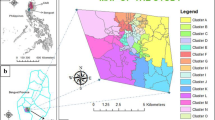Abstract
Composting systems are poised to make a significant impact on waste-management strategies and greatly contribute to global sustainability efforts. However, risk of contamination by potentially detrimental compounds must be overcome before these systems can be widely adopted. Behavior analytic approaches to waste disposal adherence have consisted of antecedent and consequence strategies; many such strategies require continual oversight and significant investment of resources to maintain effectiveness. This project describes a field study that investigated a purely antecedent-based approach to nudge proper organic recycling on a university campus. Using a multiple-baseline design across dining sites, we demonstrate the efficacy of enhanced compost bins (i.e., green colored bins with a hinged door and an accompanying placard indicating site-specific materials that can and cannot be composted) to reduce product contamination by inorganic or unsuitable organic refuse. Implications for future research and suggestions for university implementation are discussed.

Similar content being viewed by others
Notes
In the Thaler and Sunstein framework (2008; p. 6), nudges are “any aspect of the choice architecture that alters people’s behavior in a predictable way without forbidding any options or significantly changing their economic incentives. To count as a mere nudge, the intervention must be easy and cheap to avoid.” As behavior analysts, we interpret this concept as an antecedent-based intervention grounded in behavioral science, with a high degree of social validity and maintenance effects.
References
Ahmad, R., Jilani, G., Arshad, M., Zahir, Z. A., & Khalid, A. (2007). Bio-conversion of organic wastes for their recycling in agriculture: An overview of perspectives and prospects. Annals of Microbiology, 57(4), 471–479. https://doi.org/10.1007/BF03175343.
Austin, J., Hatfield, D. B., Grindle, A. C., & Bailey, J. S. (1993). Increasing recycling in office environments: The effects of specific, informative cues. Journal of Applied Behavior Analysis, 26(2), 247–253. https://doi.org/10.1901/jaba.1993.26-247.
Barnes, S., Baxter, M., Birzer, H., Goodeve, A., Stensen, J., & Tse, J. (2015). An investigation into the degree and reasons for contamination of outdoor organic waste stations at the University of British Columbia. doi:https://doi.org/10.14288/1.0223920.
Binder, K., Glasser, H., & Fuqua, R. W. (2017). A behavioral approach to the development of a campus-wide recycling system. Sustainability: The Journal of Record, 10(1), 39–44. https://doi.org/10.1089/sus.2017.29082.kb.
Brothers, K. J., Krantz, P. J., & McClannahan, L. E. (1994). Office paper recycling: A function of container proximity. Journal of Applied Behavior Analysis, 27(1), 153–160. https://doi.org/10.1901/jaba.1994.27-153.
Burgess, R. L., Clark, R. N., & Hendee, J. C. (1971). An experimental analysis of anti-litter procedures. Journal of Applied Behavior Analysis, 4(2), 71–75. https://doi.org/10.1901/jaba.1971.4-71.
Cina, L., Gezella-Baranczyk, M., & Wedl, M. (2017). Composting contamination in corporate settings. Retrieved from https://conservancy.umn.edu/handle/11299/192050
Cogger, C. G. (2005). Potential compost benefits for restoration of soils disturbed by urban development. Compost Science and Utilization, 13(4), 243–251. https://doi.org/10.1080/1065657X.2005.10702248.
Cone, J. D., & Hayes, S. C. (1980). Environmental problems/Behavioral solutions. Monterey: Brooks/Cole.
de Bertoldi, M., Vallini, G., & Pera, A. (1983). The biology of composting: A review. Waste Management & Research, 1(2), 157–176. https://doi.org/10.1177/0734242X8300100118.
DeLeon, I. G., & Fuqua, R. W. (1995). The effects of public commitment and group feedback on curbside recycling. Environment and Behavior, 27(2), 233–250. https://doi.org/10.1177/0013916595272007.
Duffy, S., & Verges, M. (2009). It matters a hole lot: Perceptual affordances of waste containers influence recycling compliance. Environment and Behavior, 41(5), 741–749. https://doi.org/10.1177/0013916508323737.
Friman, P. C., & Poling, A. (1995). Making life easier with effort: Basic findings and applied research on response effort. Journal of Applied Behavior Analysis, 28(4), 583–590. https://doi.org/10.1901/jaba.1995.28-583.
Fritz, C. O., Morris, P. E., & Richler, J. J. (2012). Effect size estimates: Current use, calculations, and interpretation. Journal of Experimental Psychology: General, 141(1), 2–18. https://doi.org/10.1037/a0024338.
Geller, E. S. (2016). Actively caring for mother earth. In E. S. Geller (Ed.), Applied psychology: Actively caring for people (pp. 594–622). New York: Cambridge University Press.
Geller, E. S., Brasted, W. S., & Mann, M. F. (1979). Waste receptacle designs as interventions for litter control. Journal of Environmental Systems, 9(2), 145–160. https://doi.org/10.2190/5P46-8H2N-41JR-C2EJ.
Geller, E. S., Chaffee, J. L., & Ingram, R. E. (1975). Promoting paper recycling on a university campus. Journal of Environmental Systems, 5(1), 39–57. https://doi.org/10.2190/E2LM-JNTV-NBJ6-ETJF.
Gillett, J. W. (1992). Issues in risk assessment of compost from municipal solid waste: Occupational health and safety, public health, and environmental concerns. Biomass and Bioenergy, 3(3–4), 145–162. https://doi.org/10.1016/0961-9534(92)90023-J.
Hamad, C. D., Bettinger, R., Cooper, D., & Semb, G. (1980). Using behavioral procedures to establish an elementary school paper recycling program. Journal of Environmental Systems, 10(2), 149–156. https://doi.org/10.2190/5TL9-EPP9-XKV1-3KJT.
Hamad, C. D., Cooper, D., & Semb, G. (1977). Resource recovery: Use of a group contingency to increase paper recycling in an elementary school. Journal of Applied Psychology, 62(6), 768–772. https://doi.org/10.1037/0021-9010.62.6.768.
Hoornweg, D., Thomas, L., & Otten, L. (2000). Composting and its applicability in developing countries (Urban Waste Management Working Paper No. 8). Washington, DC: Urban Development Division, World Bank.
Hottle, T. A., Bilec, M. M., Brown, N. R., & Landis, A. E. (2015). Toward zero waste: Composting and recycling for sustainable venue based events. Waste Management, 38(1), 86–94. https://doi.org/10.1016/j.wasman.2015.01.019.
Kim, S., Oah, S., & Dickinson, A. M. (2005). The impact of public feedback on three recycling-related behaviors in South Korea. Environment and Behavior, 37(2), 258–274. https://doi.org/10.1177/0013916504267639.
Kohlenberg, R., & Phillips, T. (1973). Reinforcement and rate of litter depositing. Journal of Applied Behavior Analysis, 6(3), 391–396. https://doi.org/10.1901/jaba.1973.6-391.
KU Budget Office. (2017). The University of Kansas (Lawrence Campus) executive summary of the operating budget for fiscal year ending June 30, 2017. Retrieved from https://budget.ku.edu/sites/budget.ku.edu/files/docs/Final_FY_2017_Executive_Summary.pdf
KU Memorial Union. (2017). The KU Memorial Union 2017 annual report. Retrieved from https://union.ku.edu/annual-report#tab4name
Lim, S. L., Lee, L. H., & Wu, T. Y. (2016). Sustainability of using composting and vermicomposting technologies for organic solid waste biotransformation: Recent overview, greenhouse gases emissions and economic analysis. Journal of Cleaner Production, 111(A), 262–278. https://doi.org/10.1016/j.jclepro.2015.08.083.
Ludwig, T. D., Gray, T. W., & Rowell, A. (1998). Increasing recycling in academic buildings: A systematic replication. Journal of Applied Behavior Analysis, 31(4), 683–686. https://doi.org/10.1901/jaba.1998.31-683.
Luyben, P. D., & Bailey, J. S. (1979). Newspaper recycling: The effects of rewards and proximity of containers. Environment and Behavior, 11(4), 539–557. https://doi.org/10.1177/0013916579114006.
Montejo, C., Ramos, P., Costa, C., & Márquez, M. C. (2010). Analysis of the presence of improper materials in the composting process performed in ten MBT plants. Bioresource Technology, 101(21), 8267–8272. https://doi.org/10.1016/J.BIORTECH.2010.06.024.
O’Connor, R. T., Lerman, D. C., Fritz, J. N., & Hodde, H. B. (2010). Effects of number and location of bins on plastic recycling at a university campus. Journal of Applied Behavior Analysis, 43(4), 711–715. https://doi.org/10.1901/jaba.2010.43-711.
Richard, T. L. (1992). Municipal solid waste composting: Physical and biological processing. Biomass and Bioenergy, 3(3–4), 163–180. https://doi.org/10.1016/0961-9534(92)90024-K.
Rogger, C., Beaurain, F., & Schmidt, T. S. (2011). Composting projects under the clean development mechanism: Sustainable contribution to mitigate climate change. Waste Management, 31(1), 138–146. https://doi.org/10.1016/j.wasman.2010.09.007.
Sussman, R., & Gifford, R. (2013). Be the change you want to see: Modeling food composting in public places. Environment and Behavior, 45(3), 323–343. https://doi.org/10.1177/0013916511431274.
Sussman, R., Greeno, M., Gifford, R., & Scannell, L. (2013). The effectiveness of models and prompts on waste diversion: A field experiment on composting by cafeteria patrons. Journal of Applied Social Psychology, 43(1), 24–34. https://doi.org/10.1111/j.1559-1816.2012.00978.x.
U.S. Environmental Protection Agency. (2018a). Advancing sustainable materials management: Facts and figures. Retrieved from https://www.epa.gov/smm/advancing-sustainable-materials-management-facts-and-figures
U.S. Environmental Protection Agency. (2018b). Greenhouse gas emissions from a typical passenger vehicle. Retrieved from https://www.epa.gov/greenvehicles/greenhouse-gas-emissions-typical-passenger-vehicle
Witmer, J. F., & Geller, E. S. (1976). Facilitating paper recycling: Effects of prompts, raffles, and contests. Journal of Applied Behavior Analysis, 9(3), 315–322. https://doi.org/10.1901/jaba.1976.9-315.
Woodbury, P. B. (1992). Trace elements in municipal solid waste composts: A review of potential detrimental effects on plants, soil biota, and water quality. Biomass and Bioenergy, 3(3–4), 239–259. https://doi.org/10.1016/0961-9534(92)90029-P.
Woodbury, P. B., & Breslin, V. T. (1992). Assuring compost quality: Suggestions for facility managers, regulators, and researchers. Biomass and Bioenergy, 3(3–4), 213–225. https://doi.org/10.1016/0961-9534(92)90027-N.
Acknowledgements
We thank Chris Brown, Jeff Severin, Nona Golledge, Sheryl Kidwell, Alecia Stultz, Kirby Ostrander, and the KU Dining Services and staff for their institutional support in this project, as well as Lydia Gibson and Missouri Organic Recycling for project materials and assistance. This project was supported and funded by the University of Kansas Environmental Studies Ruben Zadigan Scholarship and a KU Undergraduate Research Award awarded to the first author.
Author information
Authors and Affiliations
Corresponding author
Ethics declarations
This project was supported and funded by the University of Kansas Environmental Studies Ruben Zadigan Scholarship and a KU Undergraduate Research Award awarded to the first author.
Ethical Approval
All procedures performed in studies involving human participants were in accordance with the ethical standards of the institutional and/or national research committee and with the 1964 Helsinki declaration and its later amendments or comparable ethical standards.
Informed Consent
Informed consent was unnecessary given the absence of individual participant data collection and sole reliance on outcome data (e.g., refuse/compost weights).
Conflict of Interest
David Szczucinski declares that he has no conflict of interest. Brett W. Gelino declares that he has no conflict of interest. Christopher J. Cintron declares that he has no conflict of interest. Amel Becirevic declares that he has no conflict of interest. Derek D. Reed declares that he has no conflict of interest.
Additional information
Publisher’s Note
Springer Nature remains neutral with regard to jurisdictional claims in published maps and institutional affiliations.
• This work represents a replication of the efficacy of antecedent intervention for increasing sustainable behavior.
• The methods depicted herein demonstrate a low cost, low demand strategy for influencing behavior by adhering to a nudge-type framework—a relatively novel contribution to the behavior analytic sustainability literature.
• This study extends the existing body of literature with respect to behavior analysis and ecological responsibility, and provides a potential framework for similar work.
• The topic of the current work—composting—has thus far remained unmentioned through much of the behavior analytic work in sustainability. This study provides a novel approach for examination of composting-type behavior.
• The outcome of this research provides evidence for an easily implemented strategy to promote sustainability and ecological responsibility within an organizational setting.
Rights and permissions
About this article
Cite this article
Szczucinski, D., Gelino, B.W., Cintron, C.J. et al. Increasing Appropriate Composting in High-Traffic University Settings. Behav Analysis Practice 13, 22–28 (2020). https://doi.org/10.1007/s40617-019-00358-1
Published:
Issue Date:
DOI: https://doi.org/10.1007/s40617-019-00358-1




